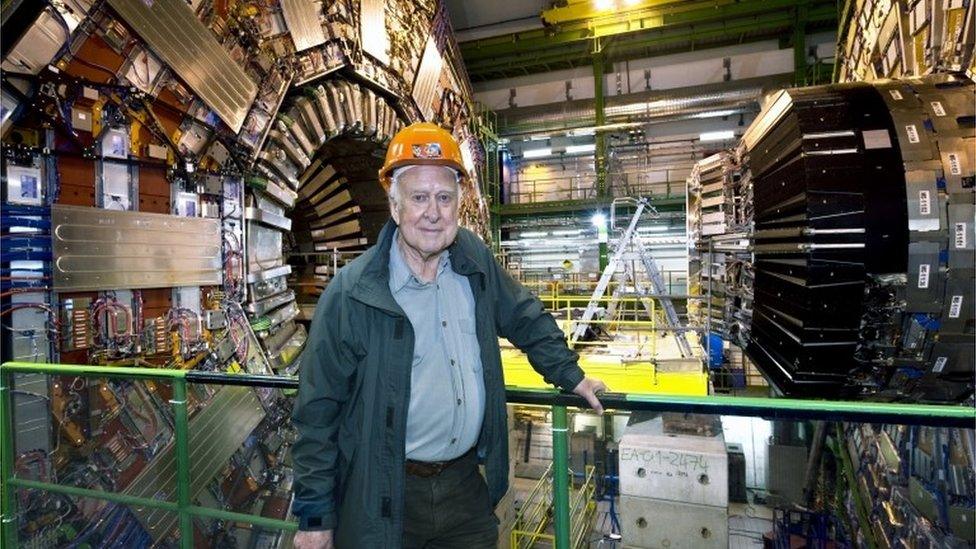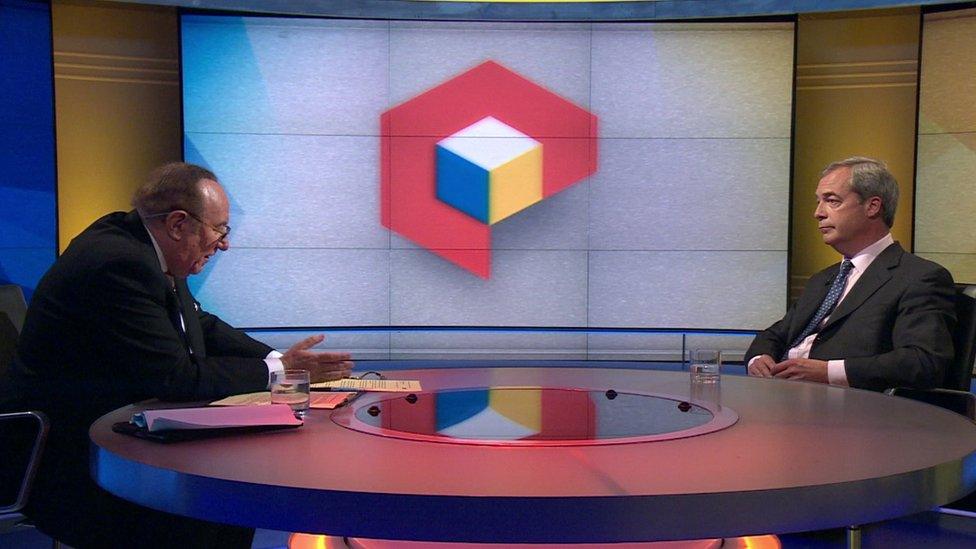Nobel prize winners warn leaving EU poses 'risk' to science
- Published

Nobel prize-winning scientist Peter Higgs says he wants the UK to remain in the European Union
Leaving the EU poses a "key risk" to British science, a group of 13 Nobel prize-winning scientists have warned.
The group, which includes Peter Higgs, who predicted the existence of the Higgs boson particle, and geneticist Sir Paul Nurse, say losing EU funding would put UK research "in jeopardy".
"Inside the EU, Britain helps steer the biggest scientific powerhouse in the world", the group claim.
Vote Leave said it was a "myth" that funding came from Brussels.
'Critical mass'
In a letter to the Daily Telegraph, external the group said science should be "front and centre in the EU debate" as it was a key driver in health, innovation and economic growth.
"The EU contains a critical mass of expertise, with more than one in five of the world's researchers moving freely within its boundaries.
"EU decisions about scientific policy, funding and regulatory frameworks affect science the world over, and are influenced by British scientists. On the inside, Britain has access to people and funding and wields global scientific influence, far greater than we have alone."
The signatories also include Sir Martin Evans, the chancellor of Cardiff University who was awarded for his work into stem cells, and Sir Andre Geim who won a Nobel prize for groundbreaking work on graphene, a material expected to revolutionise manufacturing.
Contingency plans
The letter comes as MPs urged ministers to draw up contingency plans to protect the UK's science sector in the event of a vote to leave the EU on 23 June.
The Commons Science and Technology Committee said the UK benefited "significantly" from access to EU research budgets and would have to seek other sources for funding if it was withdrawn.
It highlighted the "cautionary example" of Switzerland, which was denied access to science funding programmes when the EU imposed sanctions in response to a vote to curtail the freedom of movement.
Committee chairman Nicola Blackwood said: "In light of this, the government must conduct a risk analysis of the impact that a vote to leave would have on science funding and international collaboration."
The committee - which includes supporters of both Leave and Remain - did not come down on either side in the debate, noting that there were both benefits and costs to the UK science sector from EU membership.
It comes after Prof Stephen Hawking said Brexit would be a "disaster for UK science".
But a group of researchers arguing the case for an EU exit disagreed saying Britain would be no worse off on the outside.
Prof Angus Dalgleish from the University of London and a spokesman for "Scientists For Britain" said: "We are standing up against what is a very large body of people who feel that if we leave the EU it will be a disaster for funding and collaboration - and we completely refute that," he said.

Prof Stephen Hawking has said that many promising young scientists were recruited from Europe.
A poll of nearly 2,000 researchers, external living in the EU conducted by Nature in March found 83% were in favour of Britain staying in.
A spokesman for Vote Leave said: "The biggest myth in this campaign is that money that funds our universities, our farmers comes from a magical money tree in Brussels.
"There is no such thing as EU money - it is all paid for by British taxpayers as part of the three hundred and fifty million pounds sent to Brussels every week."
Developers vote in
Meanwhile some of Britain's largest developers have also urged voters to back Remain.
House building companies and housing associations, including Barratt Developments and Wates Group, say a vote for Brexit would cause economic uncertainty and damage investment which would make the housing crisis worse.
"What any developer requires is confidence and continued support from their financial investors - and those investors need certainty over wider market conditions," the developers wrote in an open letter.
"Leaving the EU would also have an impact on the UK's housing supply chain companies, which employ millions of people across the UK. This could disrupt the production and import of the supplies needed for building such as bricks and blocks. This will further delay and add costs on Britain's house builders."
The Vote Leave campaign said the scale of immigration from the EU was the cause of much of the pressure on the housing market.
- Published10 June 2016

- Published10 March 2016
